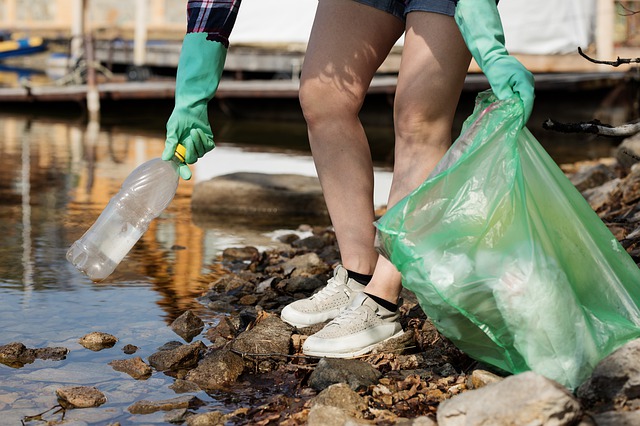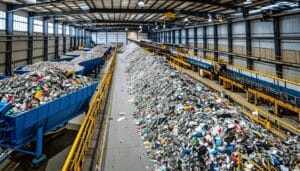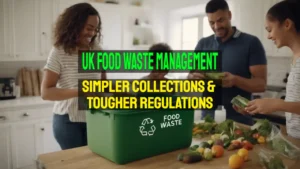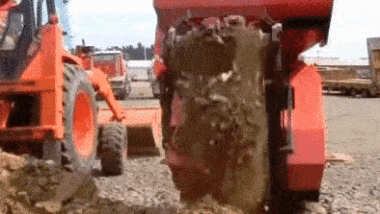We found only a few articles about Commercial Waste Companies, or commercial waste collection when considering awarding our small company's waste disposal/ recycling contract.
As a result we decided to compile this article with the facts and tips we found out.
What is Commercial Waste?
It's always a good idea to start with the basics, so here's a definition of commercial waste.
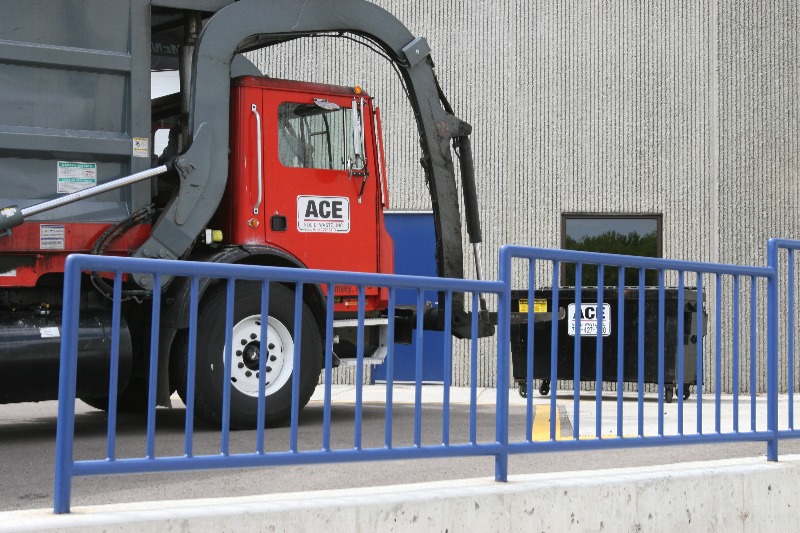
Commercial waste is defined in the US, and broadly speaking the same in Europe as any waste product that is created from commercial activity. So whether you're a builder needing to clear construction waste or an office discarding paper documents, it's all categorised in the same way.
This also applies for any business waste you produce from a home-based company. For example, this could be the food waste created if you run a cake-making business. Again, the official definition is clear: whatever waste is produced from commercial activity is considered as business waste and must be disposed of as such. It can't go in your domestic refuse bins – you have to register for a commercial waste bin.
What is Commercial Waste Collection?
Commercial waste consists of waste from premises used mainly for the general purposes of a business or trade or for the purpose of recreation, education, sport, or entertainment. It does not include household, agricultural, or industrial waste as the result of construction activities.
It usually consists of a mixture of heavy loads of timber, concrete, bricks, tile, rubble, metal, plastics, plasterboard, cardboard, and paper. This material is typically the result of work done through all stages of construction, site clean-ups, and domestic clean-ups. Commercial waste is non-hazardous.
Commercial waste is a type of industrial waste that is generated as the result of activities in the business sector. Unlike industrial waste, which comes from factories and industrial plants, commercial waste arises from the activities of wholesalers, catering establishments, shops, and offices.
It can be further sub-categorized based on the specific commercial activities, including hazardous waste (small in quantity but requiring special treatment) and commercial and demolition waste (large quantities, estimated at 72.5 million tons in 1999, but largely inert).
Sometimes referred to as business waste, disposal of commercial waste is typically the responsibility of each individual business. Companies are expected to make their own arrangements for the collection, treatment, and disposal of their wastes. Waste from smaller shops and trading estates where there are local authority waste collection agreements in place generally falls under the category of municipal waste. via www.safeopedia.com
So, that's the core of the problem for companies. It's what should they be looking for when developing their policy for for the collection, treatment, and disposal of their wastes?
Commercial Waste Collection Company Selection
In the UK there are at least 20 guaranteed trustworthy companies which will collect commercial waste from business premises throughout the main cities and towns of the United Kingdom. We refer to the largest 20 waste management companies.
The same is true for the US, although the spread of their services may not be as comprehensive due to the much larger areas involved.
A list of those companies for the UK is provided here.
When approaching the companies in that list, and any similar list in the US, businesses can request a quotation for commercial waste collection service provision on a term contract basis with any of them and be confident that the waste they collect will be handled in the manner which they agree to provide.
No doubt in both the UK and the US, and many other nations there are many more commercial waste collection companies which are dependable and honest. Nevertheless, a problem arises with fly-tipping (illegal tipping of collected wastes).
List of Waste Collection Company Selection Criteria
1. Compliance with Company Sustainability Policy
We recommend that all companies, even the smallest should consider their waste disposal policy as part of their overall responsibilities as they grow larger to comply with the wider imperatives for society to become more sustainable. In general, a company sustainability policy is used to set targets for company actions to encourage efficient the use of energy, and materials.
Sustainability goals will usually extend beyond the companies actions while materials are on-site, and forward thinking companies will generally wish to appoint a waste collection contractor which will become a partner in their aims to become more sustainable.
Thus, an important selection criteria for a waste collection contractor will be the manner in which the contractor will comply with the waste heirarchy. In effect, that being the waste company's policies to work to:
- avoid waste,
- minimize it when avoidance is not possible, and
- when waste is inevitably produced and cannot be re-used in some way, recycle the materials as priority
- when the materials cannot be recycled without excessive cost, or the application of energy intensive processes which would themselves be sustainable, extract the embedded energy by burning (incineration).
2. Requirements for Recycling In-house
Waste collection company rules for material segregation prior to collection vary. Selection criteria vary for waste collection. Some contractors mix such materials as paper and cardboard, for example, while others require separate containers.
The business may wish to select a collection contractor to ensure that the way in which the business already sorts waste ready for collection in-house, can be easily aligned with the rules of the collection contractor.
3. Frequency of Collection
Waste collection contractors offer different collection times and frequencies.
In some industries such as catering during hot weather more frequent collection than normal will be needed. Therefore, a selection criteria for discussion with each collection company may be to find out whether the required frequency of collection can be provided. if it can, it will need to be at reasonable cost.
4. Cost
Clearly, cost will always be a selection criteria.
5. Regulatory Compliance
Naturally, as explained below, an obvious selection criteria will be to actually carry out simple checks to ensure that the waste disposal route and reception facilities named are consistent with the price and service offered.
Checks should always be carried out to ensure:
- The waste collection contractor is licensed for the waste types which will be handled.
- The reception point for the waste is suitable and licensed for that form of waste acceptance.
Read on to find out how UK businesses carry out their “Due Diligence Checks” using the UK's Environment Agency Public Register database.
Businesses Take Care Not to be Taken to Court and Fined for Negligence in their Commercial Waste Disposal
Fly-tippers invariably promise to remove commercial waste from businesses, but make huge profits by simply taking those wastes down a quiet lane, or into a farm field not far away, and emptying their load for free, right there.
Small businesses in particular are at risk from this behavior, which ruins the environment wherever it is done.
In the UK there are laws to prevent fly-tipping, and no doubt they are present in other nations as well.
Don't be a small business which falls-foul of environmental law. Failing to comply with environmental law is a criminal offence just like any other criminal offence and company directors risk a criminal record for failing to comply.
All Businesses Hold a Duty to Act Responsibly and CHECK that their Commercial Waste Collection Contractor holds the required licence to transport waste.
Read on to find out more about your duties, and how to check the waste contractor's licence.
UK “Duty of Care” Legislation

In the UK it is not well publicized that there is environmental legislation in place which if complied with by all small businesses would self-regulate the waste collection industry to prevent illegal tipping of waste.
The law is called the requirements for Duty of Care when allowing waste to leave any premises. It also applies to homeowners, although abuse would need to be flagrant for any prosecution to occur.
Think of this law as similar to the citizens duties to Health and Safety through the UK Health and Safety Act 1974 .
It places a duty on everyone to ensure they take on their “duty of care to protect the environment” just the same as well all take on a duty of care (under the Health and Safety Act) when we go to work, to protect our fellow workers/ citizens and not require others to undertake unsafe work.
Simple Tip 1 for all Businesses to Avoid Risk of Prosecution by the Environment Agency
Businesses which create waste are “waste holders”. Waste holders must comply with the UK waste duty of care requirements.
If you are a business owner, of any size no matter how small, you must take all reasonable steps to:
- prevent unauthorised or harmful deposit, treatment or disposal of waste (see section 3.1)
- prevent a breach (failure) by any other person to meet the requirement to have an environmental permit, or a breach of a permit condition (see section 3.2)
- prevent the escape of waste from your control (see section 3.3)
- ensure that any person you transfer the waste to has the correct authorisation (see section 3.4)
provide an accurate description of the waste when it is transferred to another person (see sections 3.5 and 3.6)
Failure to comply with the duty of care requirements is a criminal offence and could lead to prosecution. via waste-duty-of-care-code-of-practice
This sounds like an impossible task when reading official government websites such as the above list.
Our tip is that there is the easy way to provide basic compliance is to go to The EA's Waste “Public Register” page here. Look up the licence for the waste collection company you plan to appoint to collect your waste, and do not appoint them unless it is confirmed by the database record that the information provided is correct.
By doing this you are doing your bit to ensure that illegal waste collection does not take place, and providing your company with defence, should your company be accused of employing an illegal waste company.
Tip 2 – Cost of Residual Waste if Disposed to a Landfill
If a contractor offers to remove rubbish which is not recyclable, or won't be recycled for a suspiciously low price be wary. To take that waste to a landfill for less than £100/tonne, ask questions about how it can be that cheap!
The 2019 UK landfill tax, plus the charges made by the landfill operators to operate their landfills, would normally amount to over £100/tonne. On top of that expect the collection contractor to add a charge for collection and administration.
Tip 3 – Waste Collection of Recyclable Materials Can be Cheaper
Separating recyclable materials before waste collection can be cheaper than the collection price for mixed waste. It makes sense to maximize the amount of recyclable materials you collect in your business!
Revolutionizing Waste Recovery: Latest Separation And Sorting Innovations
Waste recovery is changing fast, thanks to new separation and sorting technology. This tech helps us sort trash better, so we can recycle more things. For example, Stadler has built a big plant in Spain for VAERSA that makes recycling easier and smarter. Keson is finding new ways to deal with old tyres, helping both […]
Top 10 UK Solid Waste Management Companies 2025
The UK waste management sector stands as a vital industry worth billions of pounds. The top UK Solid Waste Management Companies are the leading waste management firms in Britain. These companies handle millions of tonnes of rubbish each year. The industry has transformed significantly over the past two decades through strategic mergers and environmental innovations. […]
Ramp Method of Waste Disposal – Landfill Guide & Techniques
The ramp method optimizes landfill operations by creating an inclined surface, allowing efficient waste compaction and daily cover application. Unlike traditional methods, it requires minimal excavation, reducing costs and extending landfill lifespan. Proper implementation and equipment maintenance are key to effective ramp method performance in various terrains…
The Future of UK Food Waste Management – Simpler Collections and Tougher Regulation
The future of UK food waste management will be a big push toward higher recycling rates through simpler collection and far greater consistency across the nations, helping citizens understand how to be green and recycle more organic waste. As the UK continues to advance its environmental goals, recently announced government policies aimed at simplifying waste […]


